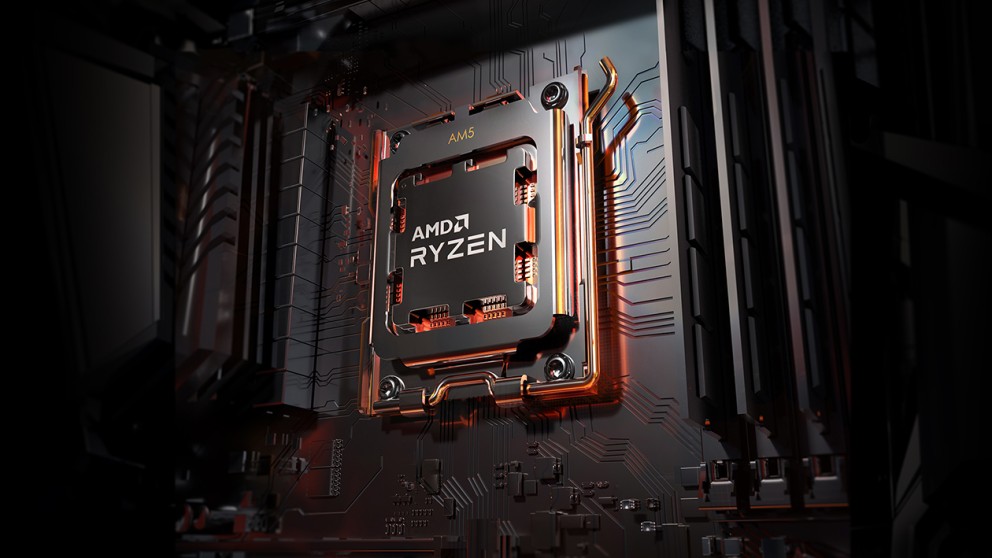‘Zen 4’ CPUs promise to deliver significant performance boost in CAD, BIM and rendering workflows
AMD has launched the Ryzen 7000 Series, a new family of desktop processors based on its 5nm ‘Zen 4’ architecture. This includes the flagship 16-core Ryzen 9 7950X, which AMD claims is the fastest desktop CPU in the world, featuring a 5.7 GHz boost frequency and a significant Instructions Per Clock (IPC) increase, compared to its previous generation ‘Zen 3’ architecture.
According to AMD, the Ryzen 7000 Series will outperform 12th Gen Intel Core processors in both single threaded workflows (which is important for CAD and BIM) and multi-threaded workflows, such as ray trace rendering.
In V-Ray Render, for example, AMD claims the Ryzen 9 7950X offers 62% more performance than the Intel Core i9-12900K, Intel’s current flagship mainstream CPU which has 8 Performance cores and 8 Efficient Cores. However, stated performance gains in other rendering benchmarks are smaller, with Cinebench R23 NT at 41% and Blender Render at 36%.
AMD’s new Ryzen 7000 Series also marks a significant improvement over AMD’s ‘Zen 3’ Ryzen 5000 Series. Compared to the Ryzen 9 5950X, the Ryzen 9 7950X boasts a single-core performance improvement of up to 29% and up to 48% more performance when rendering in V-Ray and Cinebench R23 nT.
While AMD Ryzen 7000-based workstations should soon become widely available from specialist manufacturers such as Scan, Workstation Specialists and BOXX, they are less likely to appear in workstations from the major manufacturers – at least any time soon.
The Ryzen 7000 Series also offers ‘leadership energy efficiency’, claims AMD. The company states that the Ryzen 9 7950X is up to 47% more energy efficient than the Intel Core i9-12900K when ray trace rendering in the Chaos V-Ray Benchmark.
With a TDP of 170W the Ryzen 9 7950X is more power-hungry than the 105W Ryzen 9 5950X it replaces. However, the 7950X wins out in performance per watt. It delivers the same performance as the 5950X while using up to 62% less power, says AMD.
The Ryzen 7000 Series also marks the launch of the new Socket AM5 platform, which features dual-channel DDR5 memory and support for PCIe 5.0, including next generation SSDs.
AMD Ryzen 7000 Series
There are currently four models in the AMD Ryzen 7000 Series – the 16-core Ryzen 9 7950X, 12-core Ryzen 9 7900X, 8-core Ryzen 7 7700X and 6-core Ryzen 5 7600X. The lower-core count CPUs, which are perhaps best suited to entry-level CAD and BIM workflows, also have slightly lower boost frequencies than the higher core count models.
| Model | Cores/Threads | Boost10/
Base Frequency |
Total Cache | PCIe® | TDP | SEP (USD) |
| AMD Ryzen 9 7950X | 16C/32T | Up to 5.7 / 4.5 GHZ | 80MB | Gen 5 | 170W | $699 |
| AMD Ryzen 9 7900X | 12C/24T | Up to 5.6 / 4.7 GHZ | 76MB | Gen 5 | 170W | $549 |
| AMD Ryzen 7 7700X | 8C/16T | Up to 5.4 / 4.5 GHZ | 40MB | Gen 5 | 105W | $399 |
| AMD Ryzen 5 7600X | 6C/12T | Up to 5.3 / 4.7 GHZ | 38MB | Gen 5 | 105W | $299 |
The AMD Ryzen 7000 series is expected to be available beginning September 27.
What AEC Magazine thinks
The AMD Ryzen 7000 Series promises to be a very significant processor for those using CAD and BIM software, as well as multi-threaded workflows such as ray trace rendering, point cloud processing and simulation. It marks a significant improvement over the Ryzen 5000 Series and AMD claims the Ryzen 9 7950X will significantly outperform the Intel Core i9-12900K, particularly in rendering workflows. However, with 13th Gen Intel Core ‘Raptor Lake’ CPUs rumoured to launch in Q4 2022, AMD will soon face increased competition.
In the workstation sector, Intel’s trump card continues to be market penetration. While AMD Ryzen 7000 Series-based workstations should soon become widely available from specialist manufacturers such as Scan, Workstation Specialists, Boston and BOXX, they are less likely to appear in workstations from the major manufacturers – at least any time soon.
Of the big four (Dell, HP, Lenovo and Fujitsu) Lenovo is the only one to offer a mainstream AMD-based desktop workstation, the ThinkStation P358. However, the compact tower, which only launched earlier this month, features the ‘Zen 3’ Ryzen 9 Pro processor, rather than the ‘Zen 4’ Ryzen 7000 Series, so is a generation behind. AMD has not announced a ‘Zen 4’ Ryzen 9 Pro processor.






